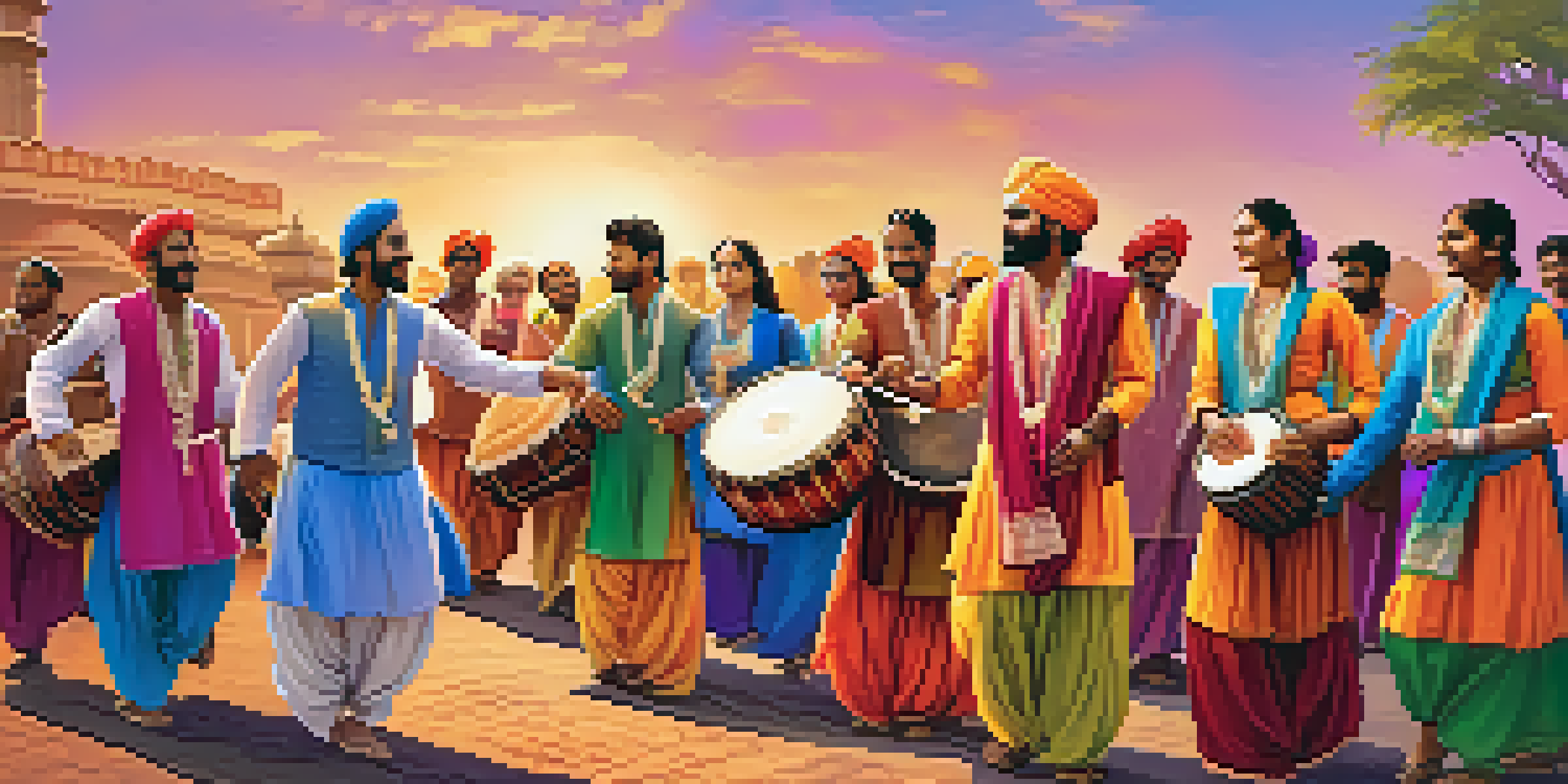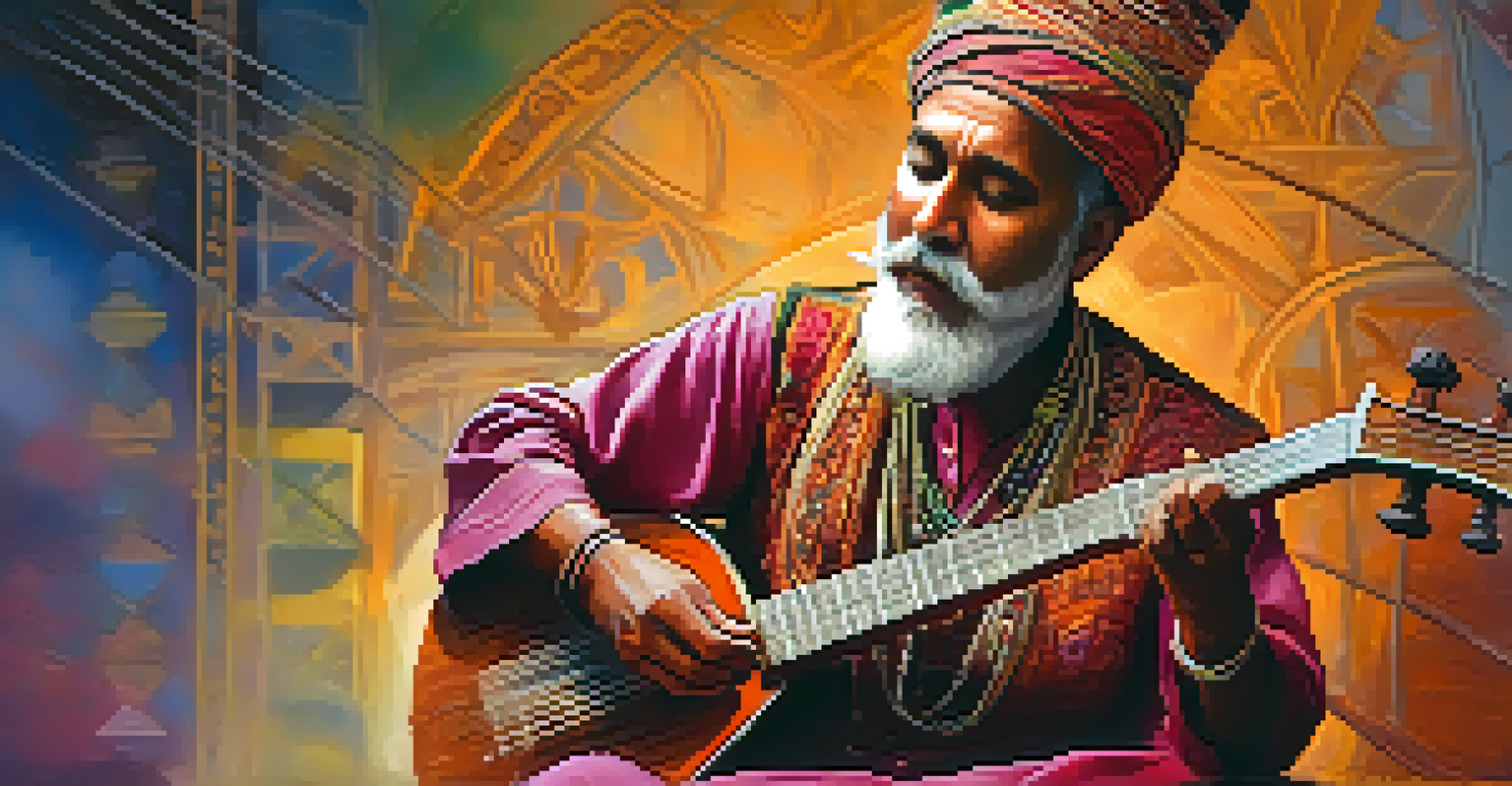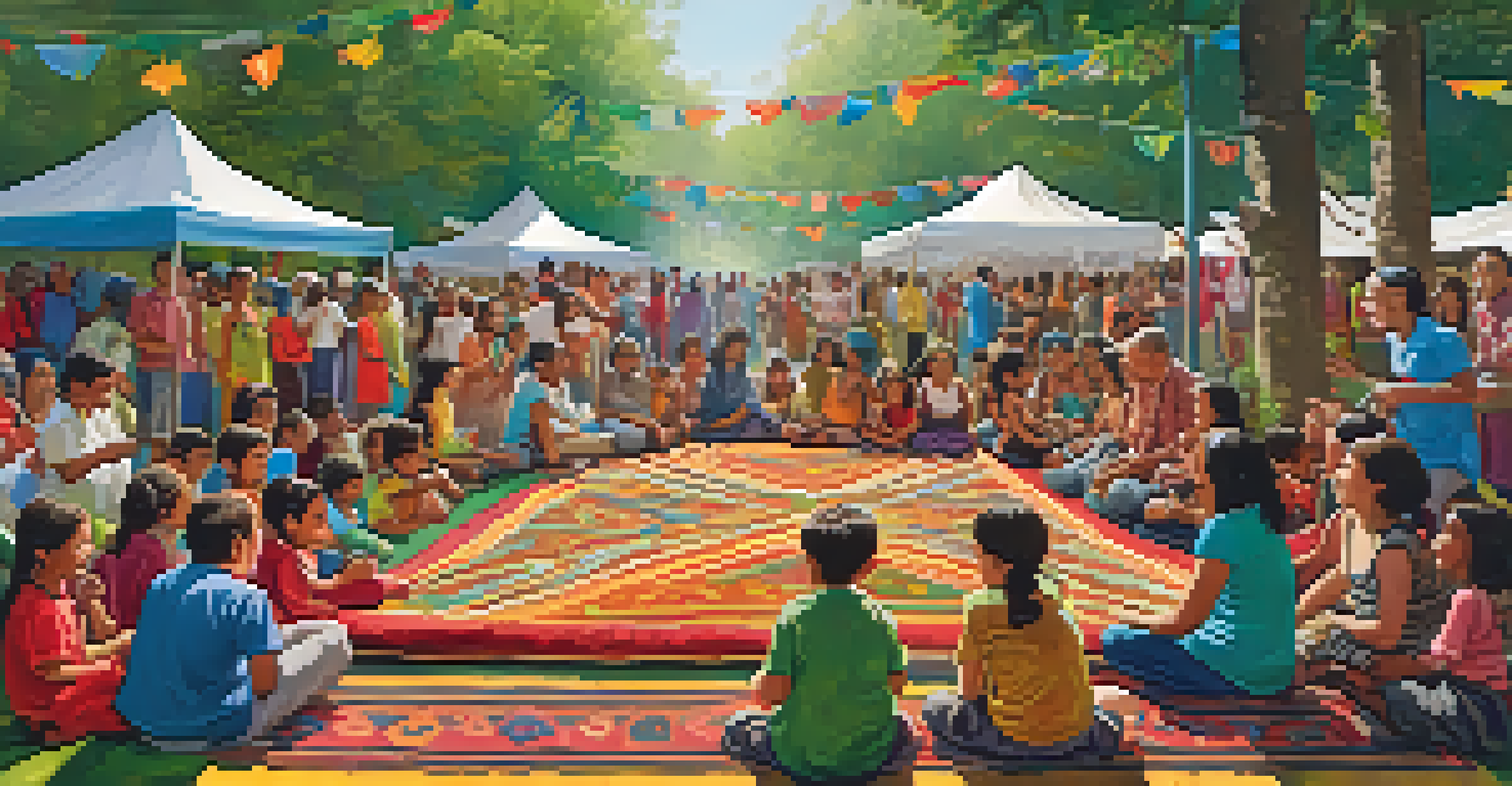The Role of Folk Music in India's Regional Festivals Today

Folk Music: The Heartbeat of Cultural Identity in Festivals
Folk music serves as a vital thread that weaves together the cultural fabric of India. Each region boasts its own unique musical styles, reflecting local traditions, languages, and histories. For instance, the vibrant beats of Bhangra in Punjab or the soulful melodies of Baul in Bengal bring communities together, fostering a sense of belonging and pride.
Music is the universal language of mankind.
During festivals, folk music is often performed live, creating an electrifying atmosphere. These performances not only entertain but also educate younger generations about their heritage. The songs tell stories of love, labor, and life, making them an essential part of the festivals that celebrate these themes.
Moreover, folk music acts as a bridge between the past and present, ensuring that age-old traditions are not lost. As modern influences emerge, many folk artists adapt their styles while maintaining the core essence of their music, thus keeping the tradition alive in contemporary contexts.
Celebrating Festivals: A Melodic Journey Across India
India is a land of diverse festivals, each celebrating unique aspects of life, spirituality, and nature. From Diwali to Pongal, music plays a pivotal role in enhancing the festive experience. During these celebrations, folk music is often accompanied by traditional dance forms, creating a sensory feast that captivates participants.

For example, during the Baisakhi festival in Punjab, the lively tunes of folk songs encourage everyone to join in the dance, igniting a joyful spirit. Similarly, the Gudi Padwa festival in Maharashtra features the melodious sounds of Lavani, which reflect the region's rich cultural heritage. Such experiences highlight the unifying power of music across different communities.
Folk Music: Cultural Identity Anchor
Folk music is essential in celebrating and preserving India's diverse cultural identities, particularly during festivals.
As cities grow and traditions evolve, the essence of these folk performances remains intact. Local musicians often collaborate with artists from other regions, creating fusion music that celebrates India's rich diversity. This evolution not only keeps the music relevant but also enriches the overall festival experience.
The Role of Technology in Reviving Folk Music Traditions
In recent years, technology has played a significant role in reviving and promoting folk music across India. Social media platforms, music streaming services, and video-sharing apps have provided a stage for folk artists to showcase their talents to a wider audience. This digital presence helps preserve traditions while making them accessible to younger generations who may not experience them firsthand.
Folk music is a reflection of the culture and history of a people.
For instance, many artists have taken to platforms like YouTube to share their performances, attracting followers from around the globe. This exposure not only boosts their careers but also fosters appreciation for regional cultures. Furthermore, online collaboration has led to innovative blends of folk music with other genres, creating fresh sounds that resonate with modern listeners.
By harnessing technology, folk music continues to thrive, adapting to contemporary tastes while staying rooted in tradition. This balance ensures that India's rich musical heritage remains alive and relevant even in an ever-changing world.
Local Communities: Guardians of Folk Music Heritage
Local communities play a crucial role in preserving folk music traditions, acting as the custodians of their cultural heritage. Elders often pass down songs, stories, and dance forms to younger generations, ensuring that these practices are not forgotten. This transmission of knowledge fosters a connection between the past and present, deepening the sense of community.
During festivals, community gatherings often serve as platforms for showcasing local talent. Villagers come together to celebrate their culture through music, dance, and storytelling, reinforcing social bonds. These gatherings also provide a space for creative expression, allowing individuals to contribute their unique perspectives to the collective heritage.
Technology Revives Folk Traditions
Modern technology has enhanced the visibility and accessibility of folk music, allowing it to thrive among younger audiences.
Moreover, community involvement in folk music strengthens local identity. By participating in festivals and performances, individuals gain a sense of pride in their roots, reinforcing the importance of maintaining traditions. This communal effort ensures that folk music remains a vibrant part of India's cultural landscape.
Folk Music as a Medium of Social Change and Awareness
Folk music in India often serves as a powerful medium for social change, addressing contemporary issues while keeping traditions alive. Many folk artists use their music to highlight social injustices, environmental concerns, and cultural identity, making their performances not just entertaining but also thought-provoking. This blend of art and activism resonates deeply with audiences, inspiring them to reflect on pressing issues.
For instance, during the recent farmers' protests, folk songs emerged as anthems of resistance, uniting people around a common cause. Artists like Gurdas Maan and Shubha Mudgal infused their performances with messages of solidarity and hope, highlighting the role of folk music in social movements. Such examples illustrate how folk music can amplify voices that might otherwise go unheard.
By engaging with social issues through their art, folk musicians not only preserve their cultural heritage but also contribute to meaningful dialogues within society. This dynamic interaction between music and activism enriches the overall festival experience, encouraging audiences to think critically about the world around them.
The Influence of Globalization on Folk Music in Festivals
Globalization has undeniably influenced folk music traditions in India, introducing new elements while challenging the preservation of cultural identities. As international music styles blend with local sounds, artists often experiment with their craft, creating unique fusions that appeal to diverse audiences. This evolution can be seen in festivals where traditional folk music coexists with global genres.
For example, at the NH7 Weekender music festival, folk artists collaborate with rock and electronic musicians, showcasing the versatility of their art. While this fusion can breathe new life into folk music, it also raises questions about authenticity and cultural appropriation. Striking a balance between innovation and tradition is essential for maintaining the integrity of folk music.
Globalization Shapes Folk Music
Global influences are transforming folk music in India, creating innovative fusions while raising questions about authenticity and cultural preservation.
Despite these challenges, globalization can also provide opportunities for folk musicians to reach wider audiences. By participating in international festivals and collaborations, they can share their rich heritage with the world, fostering greater appreciation for India's diverse musical landscape. This exposure can ultimately empower artists to continue evolving while remaining true to their roots.
The Future of Folk Music in India's Festivals
As we look to the future, the role of folk music in India's regional festivals appears promising yet dynamic. With a growing interest in cultural preservation among younger generations, there is a renewed appreciation for traditional music. This enthusiasm is evident in the increasing number of folk music festivals and workshops that aim to educate and engage audiences.
Moreover, the rise of independent music labels and platforms dedicated to folk artists has provided them with new avenues for exposure. This support system encourages artists to experiment with their craft while staying connected to their roots. Consequently, folk music is poised to remain a vital part of India's cultural landscape, adapting to contemporary trends without losing its essence.

Ultimately, the future of folk music in India's festivals hinges on the collective efforts of communities, artists, and audiences. By embracing innovation while honoring tradition, we can ensure that this cherished aspect of our heritage continues to thrive for generations to come.